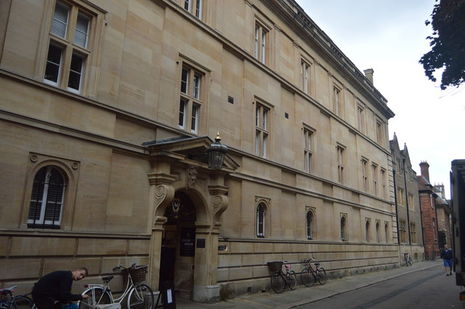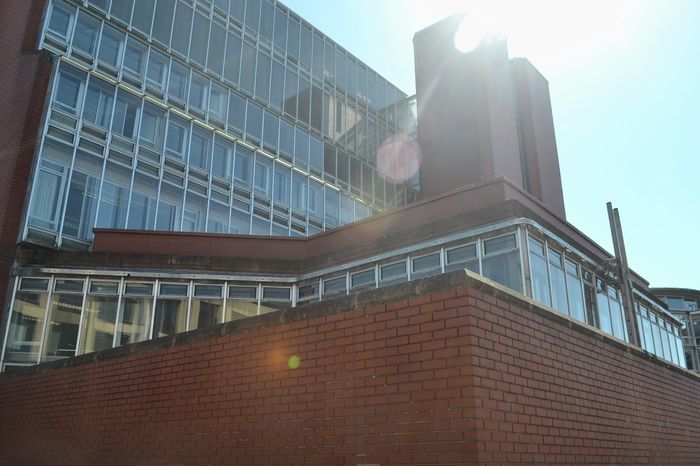Trinity Hall Master and accused Fellow to stand down pending investigation
Dr Jeremy Morris and Dr William O’Reilly will temporarily stand down from their duties amidst increasing criticism surrounding accusations of mishandling sexual misconduct allegations

Content note: This article contains discussion of sexual harassment and assault.
Trinity Hall Master Rvd Jeremy Morris and Fellow Dr William O’Reilly have agreed to temporarily withdraw from their college duties, “pending the College’s further consideration of recent events,” according to a statement released by the College last night.
The College’s announcement follows mounting calls for their resignation from students and alumni over allegations they mishandled multiple sexual assault complaints.
On Monday, an investigation by Tortoise Media revealed O’Reilly oversaw a disciplinary process involving multiple women’s reports of being sexually assaulted by a male student, who O’Reilly allegedly had a “close relationship” with, during his time as Acting Senior Tutor at the College in 2018, whilst himself facing an allegation that he sexually assaulted a different male student.
O’Reilly denies all the allegations and “rejects any suggestion he behaved improperly”. He attended a voluntary interview with the police in October 2018 but was never arrested or charged and no further action was taken by the police.
According to Tortoise, Morris did not inform O’Reilly of the allegation against him for five months, during which he reportedly did not investigate or take any “preventative” action against the then-Acting Senior Tutor, instead allowing him to remain in his post.
It is unclear how and whether O’Reilly’s withdrawal from college duties relates to his faculty duties, which include lecturing on two papers for Part I of the History Tripos and convening two Part II papers.
Varsity understands that O’Reilly has postponed his scheduled undergraduate teaching until further notice and that exam modifications are being considered as a way to compensate for cancelled teaching hours. Any classes that do take place would not be held at Trinity Hall.
The Faculty has yet to formally clarify if O’Reilly’s classes will resume, or whether the field-trips to Vienna that O’Reilly runs as part of his Part II papers will be taking place this year.
The length of time O’Reilly and Morris will be stepping down from their respective posts for is as of yet also unclear. According to the statement, “[t]his will be until the College, in accordance with its Ordinances and the time frames available to it, can consult further.”
On Wednesday, Trinity Hall Senior Senior Tutor Dr Clare Jackson, Junior Bursar Glen Sharp, Graduate Tutor Dr Rachel Tolley, and Professor James Montgomery held an open meeting for Trinity Hall students to address their concerns. They also announced the formation of a panel of “unconflicted Fellows” to investigate the issues raised in the Tortoise article.
The panel is due to present its interim findings to the College’s Governing Body in the first week of March.
At the open meeting, students expressed their anger at the college leadership for failing to respond satisfactorily to their questions and instead invoking issues of confidentiality.
Questions included the degree to which Morris knew about the allegation against O’Reilly and whether, as Tortoise contend, O’Reilly continued supervising students while he was being investigated by the police. O’Reilly says he withdrew from all supervisory teaching duties during this time.
They further addressed how the College had selected the membership of the investigatory panel, especially with regards to Sharp, and whether the College disputed any of the factual claims in Tortoise’s investigation.
The following day, the JCR committee agreed in a meeting Sharp “should not sit on [the] panel,” as he was “too involved” in the College’s past mishandling of the complaints, according to meeting minutes seen by Varsity. The committee also discussed holding a referendum on Morris’s position as Master of Trinity Hall.
The College’s statement did not directly address students’ concerns about its selection of Sharp to sit on the “panel set up [...] to coordinate its response to the issues raised” in the Tortoise article.
In a statement posted on their Facebook page on Wednesday, CUSU “unreservedly” condemned “Trinity Hall’s complete failure to adequately deal with complaints of sexual misconduct and support survivors” and Morris’s “total disregard for his duty of care to the students of Trinity Hall.”
Calling for his resignation as Master of Trinity Hall and University Councillor, CUSU stated allowing Morris to continue serving in either of his positions would be “an insult to students at Trinity Hall and completely undermine the University’s commitment to tackling sexual misconduct.”
These demands have also been reiterated in an open letter by the CUSU Women’s Campaign, which was signed by more than 500 current and former students within the first day of its publication.
The letter slammed Trinity Hall’s leadership for “clos[ing] ranks to protect senior members of staff, and attempt[ing] to stifle student complaints and staff who supported them.”
It added that “there is no reason to believe that Trinity Hall is worse equipped than any other college to handle these cases,” and urged all colleges to commit to referring “all cases of sexual misconduct to the Office of Student Conduct, Complaints, and Appeals (OSCCA)” and “upholding OSCCA’s findings and recommendations,” instead of handling complaints internally.
In an open letter directly addressed to Morris which was released on Varsity, the mother of a student whose case was allegedly mishandled by Morris joined the calls for his resignation, as he had “failed in making the safeguarding of the young people under [his] care [his] most important priority.”
A second open letter was also signed by more than 250 students and alumni at the History Faculty, criticising Faculty Chair Professor Alexandra Walsham for asking students to “refrain from discussing [...] with the press or on social media” matters regarding allegations against O’Reilly, a Senior Lecturer in Early Modern History.
It demanded that Walsham apologise for and retract the email, and suspend O’Reilly from his teaching duties at the Faculty.
Walsham reportedly apologised about the email to her undergraduate students in a seminar, but the History Faculty has not publicly commented on the open letter or its demands.
If you are affected by any of the issues raised in this article, the following organisations provide support and resources:
- Breaking the Silence: the University’s campaign against harassment and sexual misconduct (includes reporting mechanisms).
- Sexual Assault and Harassment Adviser: specialist University support worker who provides emotional and practical support
- Cambridge for Consent: a student-run campaign to promote consent.
- Cambridge Rape Crisis Centre: a charity for female victims of sexual violence.
- Cambridge Nightline: a confidential night-time listening service.
- Students’ Unions’ Advice Service: the Students’ Unions’ confidential, independent and impartial advice service.
 News / Reform candidate retracts claim of being Cambridge alum 26 January 2026
News / Reform candidate retracts claim of being Cambridge alum 26 January 2026 Interviews / Lord Leggatt on becoming a Supreme Court Justice21 January 2026
Interviews / Lord Leggatt on becoming a Supreme Court Justice21 January 2026 News / Report suggests Cambridge the hardest place to get a first in the country23 January 2026
News / Report suggests Cambridge the hardest place to get a first in the country23 January 2026 Comment / How Cambridge Made Me Lose My Faith26 January 2026
Comment / How Cambridge Made Me Lose My Faith26 January 2026 Features / Are you more yourself at Cambridge or away from it? 27 January 2026
Features / Are you more yourself at Cambridge or away from it? 27 January 2026









